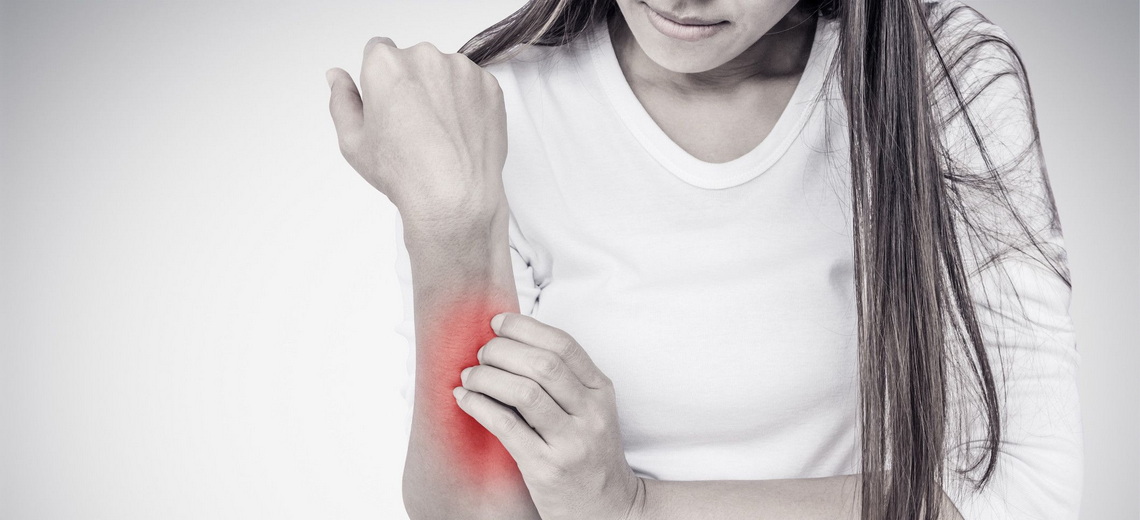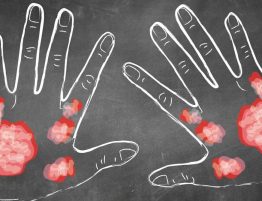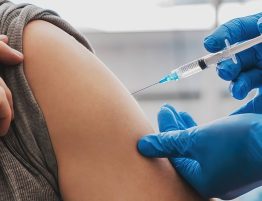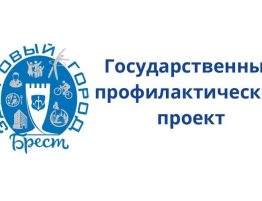
Every year on October 29 the world celebrates Psoriasis Day – one of the most common dermatological diseases. Today, about 3% of the population of our country suffers from this disease.
Psoriasis, also known colloquially as “scaly lichen“, is a non-contagious hereditary chronic skin disease. This means that no one can become infected with psoriasis, but anyone with a genetic predisposition can get it.
Genetic features that contribute to the development of the disease can be transmitted not directly from parents to children, but through generations. Children whose parents suffer from a skin disease get sick much more often than children of healthy parents. But not everyone who has this disease in the family automatically gets psoriasis. In most cases, other factors are necessary that can contribute to the onset of the disease. These include, for example, psychological stress (due to problems at work, in personal life, etc.), drug treatment (for example, uncontrolled use of non-steroidal anti-inflammatory drugs, antibiotics, etc.), bad habits (nicotine and alcohol), infections (especially streptococcal), as well as chronic irritation or damage to the skin (for example, due to sunburn, injury, etc.).
The cause of typical skin changes in psoriasis is the abnormally rapid growth and exfoliation of cells (keratinocytes), which make up the stratum corneum – the epidermis. Normally, it is completely renewed within a month, and in people with psoriasis this process is many times faster and occurs on average in 3-4 days. This leads to excessive formation of skin cells. The affected areas thicken and become covered with silvery-white scales.
Most patients develop sharply defined, reddened and slightly raised spots, the so-called papules. They are usually covered with silvery-white scales. Papules can be of different sizes, sometimes merging and forming psoriatic plaques.
Patients with psoriasis often have dystrophy of the nails. The nail plates on the hands are affected more often than on the feet.
Some patients have an acute course of the disease, while others have psoriatic rashes on the skin of the knees or elbows for several years, the so-called “duty plaques”. There is also a severe form of the disease, when almost the entire skin is affected (psoriatic erythroderma). Psoriatic arthritis develops in 10 to 15% of patients with psoriasis.
The rashes are usually not accompanied by itching. There are no scars left at the site of resolved elements, hyper- or hypopigmentation may remain. Hair growth is usually not affected.
There are three stages of psoriasis: I – progressive – the appearance of a large number of fresh rashes on the skin, especially at the sites of minor skin damage (scratches, abrasions, burns). The appearance of new rashes is often accompanied by itching; II – stationary – fresh papules do not appear, a pale depigmented border forms around the existing ones, itching practically does not bother; III – regressive – plaques flatten, flaking on their surface decreases, and they gradually resolve.
The disease manifests itself differently in each individual patient. Therefore, the course of the disease is difficult to predict. Many are ashamed to show changes in their skin, so they withdraw and avoid contact with other people. Consequently, psoriasis can also lead to psychological problems such as depression. In addition, people suffering from psoriasis are often overweight, as well as cardiovascular diseases and diabetes.
Even if psoriasis cannot be completely cured at the moment, it is possible to take control of the disease with the right therapy. This is especially true if the joints are affected. The sooner the treatment is carried out, the better you will protect your joints from possible irreversible damage.
There are also a number of steps you can take to prevent or delay flare-ups:
- Maintain good skin care.
- Live a healthy lifestyle. This means: little alcohol, no cigarettes, plenty of exercise, and a balanced diet.
- If you are overweight, try to lose weight. This will help prevent any associated conditions, such as diabetes or high blood pressure.
- Stress can contribute to flare-ups. Don’t be afraid to seek mental health help. This means that you can not only improve your quality of life, but also have a positive impact on the course of your disease.
Psoriasis treatments include medications that are applied directly to the skin (topical therapy) and medications that are taken orally or injected (systemic therapy). Various physiotherapeutic procedures (light therapy, balneotherapy, intravenous laser irradiation of blood, magnetic therapy, etc.) have a good effect. Patients with psoriasis are also recommended to undergo spa treatment.
The choice of treatment tactics is based on the forms and stages of psoriasis, the extent of the rash, its nature, and the general condition of the body. Contact dermatovenereologists, we will prescribe the therapy that will be most effective for treating your skin.
Dermatovenereologist, methodologist of the Brest Regional Dermatovenereology Dispensary, Alexey Sergeevich Zimnitsky.








